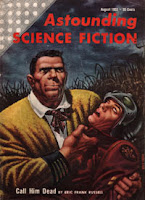Looking over the list of all the nominees, even someone who has delved deeply into the classics of
 |
| Second Ending lost in 1962 to Stranger in a Strange Land. (Image via Wikipedia) |
What is the most obscure novel ever shortlisted for the Hugo Award?
If we’re basing our definition of obscurity on the metrics provided by the book-related social media site Goodreads, the Hugo-shortlisted novel that has the fewest ratings, reviews, comments or reads is Sylva by French author Jean Bruller. First published in 1960-61, the book was translated from the French by Rita Barisse and nominated for the Hugo in 1963. Although the official Hugo Awards page does not list Rita Barisse in its citation of the book, I would argue she deserves the recognition of being named, just as Ken Liu does for his work on Three-Body Problem.
Bruller published the weird, sexual novel under his nom de guerre Vercors.* It’s a story of a man torn between his love for two women, one of whom is a heroin addict, the other is half-human half-fox. It has not aged well.
But even though that novel has been mentioned by only 53 people on Goodreads, it might still not make Sylva the most obscure novel ever to appear on a Hugo shortlist. More than 200 copies are in various libraries in North America. The lack of Goodreads interest might be because it is more often read by Francophone audiences. Additionally, it was the first non-American, non-UK novel to be on the shortlist, and for 50 years remained the only translated novel to be shortlisted – this has at least in recent years made it appear in numerous articles discussing the Three-Body Problem’s historic Hugo Win in 2015.
 |
| The third progress report of the Worldcon in 1956 lists the nominated works for the Hugo Awards. |
For our money, the most obscure Hugo shortlisted work is Call Him Dead by Erik Frank Russel. It’s
 |
| Remember this classic novel? It was on the Hugo ballot in 1956. |
It is even omitted from most histories of the Hugo Awards, as many people believe there was no shortlist published in 1956. In fact, the only reference we could find to this work’s appearance on a Hugo shortlist came from reading page 15 of the third progress report of the 1956 Worldcon, which explained that year’s voting process, and listed the nominees.
In fact, a few years ago when Jo Walton** was blogging about previous Hugo novels, her post on the 1956 Hugo Award indicates the lack of a shortlist … and she omits Call Him Dead from her suggested reading list of novels from 1956.
However, the novel was on the ballot, up against more well-known nominees such as Isaac Asimov’s The End Of Eternity, Leigh Brackett’s The Long Tomorrow and Cyril Kornbluth’s Not This August. Heinlein, of course, took home his first Hugo that year for Double Star.
Later reissued as Three To Conquer, this book shows clear influences from Heinlein’s The Puppetmasters in a tale of an alien invasion by stealth. Russel, a noted paranormalist and contributor to various Fortean publications, made his alien mind-controlling parasites more subtle than Heinlein’s, and possibly even more chilling. Despite a level of implicit sexism that is occasionally appalling, Call Him Dead is well worth picking up.
Delving into the long history of the Hugo Awards is a good reminder that in any year there are more worthy works than can ever be honoured with the top prize in science fiction. Obscure often does not mean the same thing as low-quality.
In 70 years, one might hope that readers exploring the Wikipedia list** of Hugos will note that A Closed And Common Orbit or The Algebraist received a nod, track down a copy and discover something wonderful.
* This was literally his nom de guerre, as it was his alias when he was fighting as part of the French resistance during the Second World War.
** Walton's series on past Hugo Awards is a must-read for any serious science fiction fan, as is her book of reviews "What Makes This Book So Great"
*** Or the list on whatever system supplants Wikipedia.

No comments:
Post a Comment